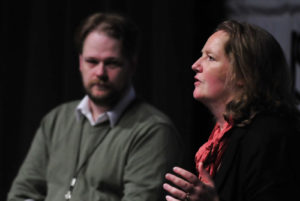Emily Bell’s five guidelines for journalism success

Emily Bell started the second day of the ISOJ conference by setting a guideline of five points for what journalist should do. Her five principles are specialization, transparency, working in public, organizing and collaborating, and becoming faster and better.
The co-author of Post-Industrial Journalism: Adapting to the Present, Bell also cited ways in which journalism is changing and what the future may look like.
She said the main theme of her report on “Adapting to the Present” is that the industrial age of journalism is over. The former director of digital content of the Guardian couldn’t describe the current state of journalism because it is so fragmented.
She said that journalists have to support the public.
According to Bell, the first need for journalists is specialization. Bell said that journalists not only need to know what they are reporting about, but they need to be more knowledgeable in aspects other than storytelling. She suggested that journalists ought to learn statistical skills along with website coding. Her school even hired a statistical professor, Mark Hansen, to teach in the journalism department. The different skills help her students get jobs, whether they are in journalism or other fields.
Bell also stressed the importance of transparency for modern journalists. She said journalists must lean to admit if they do not know something. The New York Post’s recent story that 12 died at the Boston Marathon bombing was an example of poor transparency.
Bell’s third point was working in the public and becoming responsive to the audience. She said that it is no longer enough to have a notebook. According to Bell, journalists need to also organize and collaborate.
She finished her five points by saying reporters need to be faster and better. They must produce the news quickly while reporting factual information.
ISOJ 2013: Emily Bell’s keynote speech from Knight Center on Vimeo.
Bell also spoke about the changing power in business and journalism. She used the example of power moving in the NBA from the league to the team and now to the individual player. The same thing is happening in journalism with people following the individual journalist on social networks.
Bell also said The New York Times hiring the Nate Silver ahead of the 2010 mid-election was an example of the changing atmosphere in journalism. Silver, originally a baseball blogger, uses stats to predict the outcomes of elections, and Bell said he is now the lead voice in political elections.
According to Bell, American news corporations should also adjust their main business model. Media outlets do not need to make money like they currently do, she said. Bell, who is also the director of the Tow Center for Digital Journalism at Columbia University, said that Auto Trader funded the Guardian.
Concluding her presentation, Bell said the Texas Tribune is an example of smart journalism in the current environment.

